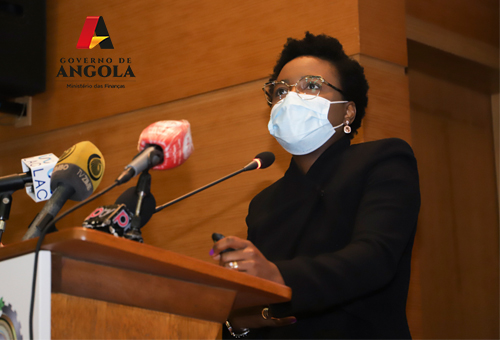You are here:
Início » Budget allocation by bodies » Internal control ensures transparency in the management of public resources
January 30, 2026 7:29
Latest update:January 3, 2023
Internal control ensures transparency in the management of public resources

The Minister of Finance, Vera Daves de Sousa, said this Monday, September 7, during a Workshop organized by the Inspectorate General of State Administration (IGAE), that internal control ensures transparency in the management of public resources.
“We will only be able to talk about budgetary discipline when we have compliance with the rules and the full functioning of the institutions that contribute to budget execution”, he assured.
Vera Daves de Sousa referred that the promotion of responsibility in public finances gives special importance to controlling the financial management of public bodies through accountability.
According to the Minister, the control of budget execution aims to ensure good management of public financial resources, so that it respects the norms and principles that govern budget execution.
It avoids carrying out expenses that are not foreseen in the budget or that exceed the amount of authorized budgetary credit; allows the detection of deviations from the principles of legality, efficiency and effectiveness of public financial management; it allows rational use of State resources to obtain the maximum social benefit with the minimum social cost.
In her speech, the minister mentioned that the authorization of non-budgeted expenses or without proper authorization, as well as the lack of programming and exemption from the budgetary limits that are defined in the budget, cause delays outside the system. And she also specified some common violations of the General State Budget Execution Rules (REOGE), namely: lack of proof of expenses; the lack of proof of delivery of the purchased goods (delivery notes, measurement report, etc); use of non-compliant invoices; lack of contracts for contractual expenses; irregular contracts; irregular travel allowances; lack of generation of equity process for capital expenditures; non-typified expenses; give public money a destination different from the one to which it is legally allocated; non-collection of revenues in the Single Treasury Account (CUT); contracting debt with suppliers of goods and services without the authorization and settlement of the expense, violating the REOGE and the Law of Public Contracts; admission of public agents, without prior authorization for admission, among others.
She also indicated the insufficiency of revenues collected in the Single Treasury Account, as a fragility that she associated with the proliferation of bank accounts.
The minister made it known, in this sense, that a bank account can only be opened with authorization from the Ministry of Finance and that indiscipline in this field has been common, both on the part of those who request and those who grant the account to be opened. “There is an urgent need for discipline in this area, on the part of those who request or who open the account”, she underlined.
“It is important that there is rigor in the establishment of contractual relations between public managers and companies that provide services. Potential providers of goods and services also have to be demanding and take responsibility, questioning public managers, asking that contracts be signed, asking for bills of expenditure, under penalty of later being ‘on fire’, as the slang says ”, warned the head of Finance.
Speaking to the press, Vera Daves also stressed that “it is not only important to act at the end of the chain, holding those who committed the illegal acts responsible, but we must also act at the beginning of the chain, training many managers who have technical weaknesses and this specific initiative [from IGAE] and others that will be repeated play a fundamental role”.
“It’s not always bad faith, it’s not always with the deliberate aim of harming the public purse, sometimes it’s pure lack of knowledge and, therefore, for that, the pedagogical component is also important. You have to reconcile the two and do it perseveringly and diligently, “she concluded.
In turn, during the debate period, the State Secretariat for the Budget and Public Investment, Aia-Eza da Silva, argued that in relation to the existence of a patrimonial process and purchases that are made for purposes other than those that are budgeted, in a way it is an old practice: “Today we are trying to stop, or at least mitigate, that is why we are developing a series of processes to no longer have this type of practice in the system”, he assured.
As for the registration of movable assets, SEOIP stated that a general inventory of all assets is being carried out across the country: “We have our Finance Delegations going to the most remote communes and localities, to carry out a survey of all the existing heritage”, he said.
The Workshop on the Internal Control System, which runs until the 7th of September at ENAPP – National School of Administration and Public Policies, also included interventions by the Inspector General of State Administration, Sebastião Gunza, the Minister of Justice and of Human Rights, Francisco Queirós, and the Secretary of the President of the Republic for State Reform, Pedro Fiete.
Source: MINFIN
Access Counter:
PUBLIC TRANSPARENCY PORTAL – ANGOLA
Providing access to information
Municipality of Talatona, Urban District of Benfica, Estrada Lar do Patriota, Rua V, Travessa II, n.º 584-A
Postal Address: Brito Godins Postal Station, Bairro Kinaxixi, Correios de Angola, PO Box n.º 10196, Luanda – Angola
Contact phone: +244 934 035 233
COPYRIGHT © 2022 – THE PUBLIC TRANSPARENCY PORTAL IS PROPERTY OF PRO BONO ANGOLA® – ALL RIGHTS RESERVED. DEVELOPED BY 15INTELLIGENCE


